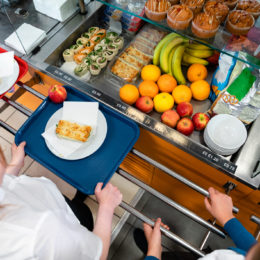With its low growth rate (up 0.6% annually by volume since 2010) and slimmer and slimmer margins (7% in 2018 compared to 13% in 2010), the institutional catering sector generated €25 billion in sales in 2019 (compared to €56 billion for commercial food service).
The widespread practice of working from home and the closure of school and company canteens at the peak of the COVID-19 pandemic further disrupted an already strained sector. In 2020, INSEE (French National Institute of Statistics and Economic Studies) reported a sharp drop in turnover across the sector: down 17% in 2019-2020 and down by as much as 40% between January and May 2020 for outsourced institutional catering.
GERMANY
Every day, 17 million Germans use an institutional catering service. This figure poses a major challenge for those structures, since the diets of these consumers are becoming more and more varied. Caterers must be attentive to these changes in order to meet their diners’ expectations by serving menus that align with the specific requirements of each person’s religion, culture and ethical principles (vegetarians, vegans, etc.). Given the high health cost of malnutrition in the country, institutions are strongly encouraging their caterers to deliver variety in their menus and offer healthier alternatives.
UK
The institutional catering market in the United Kingdom, which was hit hard by the pandemic and the closure of its establishments, is currently worth £4.4 billion. This represents a 36% hike, still not enough to return to pre-COVID levels. Then again, this market is agile, and capable of adapting to the new status quo. With the rising use of dark kitchens, it would appear that the industry is now turning towards a more hybrid, flexible model to meet its latest challenges. As a result, it is expected to attain £6.6 billion by 2026.
The institutional catering sector has displayed resilience and adaptability in reinventing itself. It’s true that it faces many constraints – such as inflation, the increased price of raw materials, consumer demands and so on – but the future looks promising for anyone able to penetrate a sector undergoing a profound transformation.
Institutional catering: A sector in the midst of transformation
Products that are fresh, local, organic… and vegetarian
Whether at companies or in schools, institutional catering reflects the evolution and the aspirations of our society: environmental protection, animal welfare, healthy food, and the list goes on. Consumers are increasingly sensitive to the impact of their dietary practices, whilst also being mindful of their budgets. The result is very high pressure on both pricing and quality, especially at school canteens.
A rise in vegetarianism has also been observed, with 85% of adults being in favour of having a vegetarian option available every day at institutional catering venues. More and more consumers have adopted a flexitarian diet, meaning they only eat meat occasionally. Given this new trend, alternative protein sources must be offered, and egg products provide a great way to easily adapt a menu to meet this demand.
Snack food flourishing in staff canteens
As a lasting effect of the COVID-19 pandemic, telecommuting has altered the institutional catering landscape, naturally leading to a decline in numbers at staff canteens. In view of the sensational expansion of meal deliveries and food trucks, staff canteen caterers have had to reinvent themselves.
Within this context, we have seen leaders in the sector rolling out new snack food options in order to align themselves with new consumer expectations. And it’s clear that this has been a success, as shown by a Xerfi-Precepta study on the new challenges facing institutional caterers.
Cocotine: A committed, engaged supplier
As a brand that is committed to quality, Cocotine is a real partner for institutional caterers. With ranges and packaging specially tailored to this sector’s needs, we help chefs serve up healthy, tasty menus to their diners.
Eggs are valuable allies in institutional catering. Whether used as simple ingredients or the main attraction, they can be worked into any course, from starters to desserts. Liquid egg is easy to add to preparations, eliminating the need to handle any shells (for safety reasons). Liquid whole egg, white or yolk can be purchased fresh or frozen, in sizes ranging from 1 to 5 kilograms. As for our egg-based products, they cover ranges that assist chefs on a daily basis (like plain and garnished omelettes, scrambled eggs, peeled hard-boiled eggs and more). And for more convenient frozen products, IQF (individual quick freezing) measures out precise portions without the pieces sticking together.
Behind Cocotine is a whole co-operative that is committed to supplying high quality products to institutional caterers. Thanks to our 230 co-op farmers, all located close to our processing plants, we are able to guarantee exemplary traceability. We possess multiple high-level certifications (ISO 9001 and 22000, FSSC 22000, BRC and more) and perform daily testing at every stage of production to ensure the outstanding sanitary and sensory quality of our egg products.
Holding true to our values, and to meet growing demand on the part of consumers, the need to take animal welfare into consideration is a fact today. With the support of the NGO Welfarm, our co-operative is in the process of eliminating all caged chicken farming (Code 3 eggs). To take this a step further, we aim to improve cage-free eggs by investing in “animal welfare cage-free” farming, which allows chickens to engage in natural behaviour by installing certain equipment in their living environments. These commitments serve our caterers, who can promote them to their diners.
Institutional chefs can count on Cocotine’s egg products each and every day, knowing they are convenient, delicious and safe. Our co-operative also supplies products to commercial restaurants and agri-food companies.





